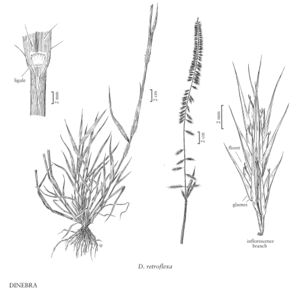Difference between revisions of "Dinebra retroflexa"
FNA>Volume Importer |
imported>Volume Importer |
||
| (2 intermediate revisions by the same user not shown) | |||
| Line 39: | Line 39: | ||
|publication year= | |publication year= | ||
|special status= | |special status= | ||
| − | |source xml=https:// | + | |source xml=https://bitbucket.org/aafc-mbb/fna-data-curation/src/200273ad09963decb8fc72550212de541d86569d/coarse_grained_fna_xml/V25/V25_104.xml |
|subfamily=Poaceae subfam. Chloridoideae | |subfamily=Poaceae subfam. Chloridoideae | ||
|tribe=Poaceae tribe Cynodonteae | |tribe=Poaceae tribe Cynodonteae | ||
Latest revision as of 17:55, 11 May 2021
Plants loosely tufted. Culms 13-120 cm, decumbent, straggling, often rooting at the lower nodes. Leaves sometimes glandular, particularly on the sheaths; blades 4.5-28 cm long, 4-8 mm wide, finely pointed. Panicles 8-34 cm; branches 0.6-5(7) cm, stiff, initially ascending, reflexed at maturity; disarticulation at the base of the branches. Spikelets 5.7-9 mm, with 1-3 florets. Glumes 5.7-9 mm, asymmetric, coriaceous, keels glandular, apices caudate-curving; lemmas 2.1-2.9 mm, narrowly ovate, appressed pubescent on the lateral veins and adjacent to the lower 1/2 of the central vein; paleas appressed pubescent on the flaps adjacent to the keels. 2n = 20.
Discussion
Dinebra retroflexa is native from southern Africa through tropical Africa to Egypt, Iraq, Pakistan, and India. It has reportedly been found on chrome ore piles in Canton, Maryland, a temporary unloading ground for ores in the Port of Baltimore (Reed 1964), and in Mecklenberg County, North Carolina. It is a common weed of rich soils in moist, tropical regions.
Selected References
None.
